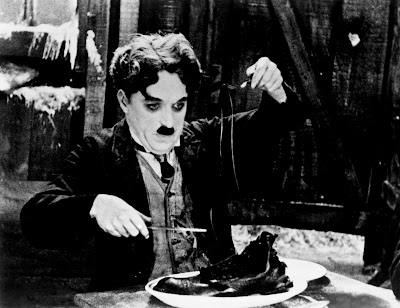Coming up on Wednesday, Aug. 28 at 7 p.m.: I'll be accompanying Chaplin's 'The Gold Rush' (1925) at the Rex Theatre, 23 Amherst St. in downtown Manchester, N.H.
It's the latest in the Rex Theatre's ongoing silent film series, which gives local audiences a chance to see great early cinema as it was intended: in a theatre, with live music, and (most importantly) with an audience.
Be a part of this shared experience—and besides, there's nothing on television this Wednesday night.
More info in the press release below. See you there!
* * *
Charlie Chaplin tries to keep warm in 'The Gold Rush' (1925).MONDAY, AUG. 19, 2024 / FOR IMMEDIATE RELEASE
Contact Jeff Rapsis • (603) 236-9237 • jeffrapsis@gmail.com
Silent masterpiece 'The Gold Rush' to screen at Rex Theatre on Wednesday, Aug. 28
Chaplin's epic comedy to feature live music by silent film accompanist Jeff Rapsis
MANCHESTER, N.H.—He was a comedic icon of the silent era, and 'The Gold Rush' was the movie that he wished to be remembered for.
He was Charlie Chaplin, whose Little Tramp character was beloved by early film audiences and remains a global icon to this day.
See
for yourself when 'The Gold Rush' (1925), a feature-length film
regarded as Chaplin's masterpiece, is screened on Wednesday, Aug. 28 at 7
p.m. at the Rex Theatre, 23 Amherst St., Manchester, N.H.
General admission is $10 per person; tickets are available at the door or online at www.palacetheatre.org.
Live
music for the movie will be provided by silent film accompanist Jeff
Rapsis, a New Hampshire-based composer who specializes in creating music
for silent films.
'The Gold Rush,' a landmark comedy and one of
the top-grossing films of the silent era, finds Chaplin's iconic 'Little
Tramp' character journeying to the frozen wastelands of the Yukon.
There as a prospector, the Tramp's search for gold turns into a pursuit
of romance, but with plenty of laughs along the way.
The film
contains several famous scenes, both comic and dramatic, including a
starving Chaplin forced to eat his shoe for Thanksgiving dinner and a
heart-breaking New Year's Eve celebration.
As a comedian, Chaplin
emerged as the first superstar in the early days of cinema. From humble
beginnings as a musical hall entertainer in England, he came to
Hollywood and used his talents to quickly rise to the pinnacle of
stardom in the then-new medium of motion pictures. His popularity never
waned, and his image remains recognized around the world to this day.
'The
Gold Rush,' regarded by many critics as Chaplin's best film, is a prime
example of his unique talent for combining slapstick comedy and intense
dramatic emotion.
" 'The Gold Rush' is still an effective
tear-jerker," wrote critic Eric Kohn of indieWIRE. "In the YouTube era,
audiences — myself included — often anoint the latest sneezing panda
phenomenon as comedic gold. Unless I’m missing something, however,
nothing online has come close to matching the mixture of affectionate
fragility and seamless comedic inspiration perfected by the Tramp."
Rapsis, who uses original themes to improvise silent film scores, said the best silent film comedies often used visual humor to create laughter out of simple situations. Because of this, audiences continue to respond to them in the 21st century, especially if they're presented as intended — with an audience and live music.
"These comedies were created to be shown on the big screen as a communal experience," Rapsis said. "With an audience and live music, they still come to life as their creators intended them to. So this screening is a great chance to experience films that first caused people to fall in love with the movies," he said.
Rapsis achieves a traditional movie score sound for silent film screenings by using a digital synthesizer that reproduces the texture of the full orchestra.
"Seeing a Charlie Chaplin film with live music and an audience is one of the great experiences of the cinema of any era," Rapsis said.
"Films such as 'The Gold Rush' were designed for a specific environment. If you can put those conditions together again, you can get a sense of why people first fell in love with the movies," Rapsis said.
'The Gold Rush' will be screened with live music on Wednesday, Aug. 28 at 7 p.m. at the Rex Theatre, 23 Amherst St., Manchester, N.H.
General admission is $10 per person; tickets are available at the door or online at www.palacetheatre.org.
For more information, call (603) 668-5588.





















